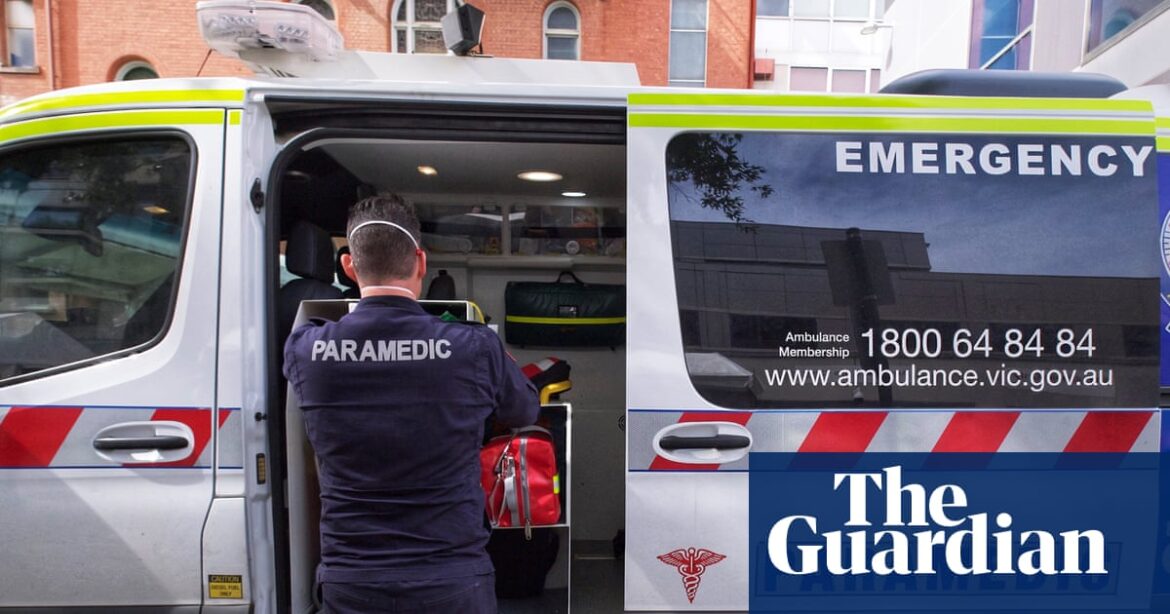Before I became a paramedic, I didn’t expect the job would change how I load a dishwasher. Or eat a sandwich. Or look at trampolines. I knew it would change how I see others – watching people die tends to do that. But nearly 10 years in, I’ve realised how much it’s quietly altered my day-to-day life.
Being a paramedic makes you see danger everywhere, so you avoid risks because you’re always expecting you’ll need to spring into action, even when you’re not in uniform. Once you’ve seen as many stretchers loaded with avoidable disasters as I have, you end up wired differently, and always brace for the next catastrophe.
I can’t walk into cafes, living rooms, or kids’ birthday parties without conducting a risk assessment. I look for the nearest exits and sharp corners and often wonder if that defibrillator sitting on the wall covered in dust still works.
At a party I once caught a toddler chewing on a deflated helium balloon. His parents were deep into their fourth round of Aperol spritzes, so I had to gently explain to them that a balloon can block an airway faster than you can sing “Happy Birthday”.
It’s from experience more than from anxiety. A loose paver. Stray grapes. A poorly timed bomb into a pool. You stop seeing everyday life as nonthreatening once you’ve spent 45 minutes tearing apart someone’s lounge room on your hands and knees looking for a button battery in the hope it’s not halfway down a digestive tract.
‘I’ve been to too many scenes where someone came off second-best to physics,’ Booth says of the risk of jumping on trampolines. Photograph: Svetlana Repnitskaya/Getty Images
I will never again get on a motorbike, or on a trampoline. No judgment to the people who ride them. Or bounce on them. But I’ve been to too many scenes where someone came off second-best to physics. Motorbikes and trampolines both offer the illusion of freedom – right until the moment your femur is split into six parts.
One of my first traumatic jobs involved a man who was clipped at an intersection. His helmet survived, but his spinal cord didn’t. I’ve seen legs detached, ribcages shattered, and vital organs thrown three metres from where they belonged.
Trampolines have morbid minds of their own. I once treated a child who launched clean off the mat and on to a garden stake. Now, every time I see someone weaving through traffic in shorts and thongs – or letting their kid somersault unsupervised on a back yard trampoline – I think: “that’s too much paperwork for my day off”. I guess you could call it pattern recognition.
I don’t touch recreational drugs – not that I would have anyway – because I’ve seen what happens when people assume their party cocaine isn’t laced with fentanyl. The Pulp Fiction-style overdoses aren’t fiction any more. And after watching the ketamine I’ve administered turn people into catatonic zombies, I’ve got no desire to try it myself (unless I take up trampolining and end up with a fractured femur).
Tim Booth: ‘Death doesn’t scare me any more. I’ve just learned to see it coming because I’ve seen it turn up in all the places you don’t expect.’
But just as I’ve learned to fear what others overlook, I’ve also stopped worrying about some of the things that send everyone else into a panic. I’ve lost count of the number of people who’ve called an ambulance because their smartwatch told them their heart rate was “elevated” or “irregular”. Some were convinced they were having a heart attack because the little waveform on the screen looks vaguely medical, as if a cheap wrist sensor compares to our $50,000 ECG machines. It’s usually anxiety. Or coffee.
We also get alerts triggered by watches mistaking burpees for car accidents, or older people dropping their watches on the tiles and the sensor thinking they’ve fallen. It’s becoming the new version of rolling on to your VitalCALL pendant in your sleep. I’m not anti-technology. I think these devices have their uses. But increasingly, people are outsourcing common sense to apps. Algorithms don’t do context.
Maybe strapping-on and plugging in to these devices is our attempt to control life’s inevitable chaos, as if a notification might keep death at bay. But I’ve seen too much in my time to believe that kind of insurance is possible.
Death doesn’t scare me any more. I’ve just learned to see it coming because I’ve seen it turn up in all the places you don’t expect. Like during a jog. Or in a McDonald’s toilet. Even halfway through mowing the lawn. I just assume the universe is indifferent.
If anything, this has made me calm. Because I’m useful in a crisis, I’m more patient with people who panic over minor things. If someone cuts their hand on a poorly stacked knife in the dishwasher, I don’t stress. I grab a tea towel and tell them if they apply some pressure, they’ll live.

